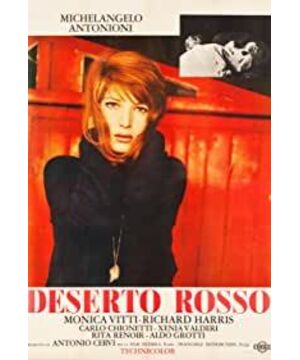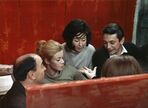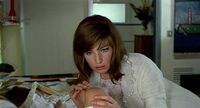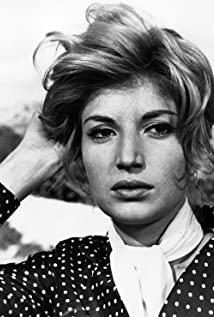Like Antonioni's modern love trilogy, "Red Desert" still feels alienated and isolated, with what seems to be an insurmountable spiritual gulf between people in the film. But unlike the other three, "Red Desert", Antonioni's first color film, explores the relationship between people and the urban environment in the post-industrial era with its unique tone, placing the relationship between people in the presented in the context of the post-industrial era. The tones of "Red Desert" are gray - the urban landscape that is heavily polluted by industry is gray and desolate, the faces of the characters are also pale, and the bright color elements in the film, such as grass, flames and flowers, are also in the overall picture. It looks incongruous and false in gray and dark tones. The whole film gives people a sense of unreality, and ironically, this sense of unreality represents the true face of the post-industrial era.
"Red Desert" is about an affair with the wife of a factory owner, Giuliana, who suffers from mental problems. Giuliana suffered a concussion in an accident and was always nervous, vulnerable and anxious. She met her husband's colleague Corrado at her husband's factory. Corrado made a statement during several encounters with Giuliana, but the relationship between the two never ended. In the end, Giuliana came to a ship by the sea and tried to leave the city where she lived, but failed. In Giuliana's shop, the last scene in the film where the hero and heroine coexist, Giuliana confesses to Corrado, "There's something terrifying about reality."
What is Giuliana afraid of? As a sensitive, vulnerable woman with mental problems, in a city with heavy industrial pollution - mechanically repetitive factory hums, toxic colored smog, grey wasteland littered with industrial waste, oil-polluted ponds and docks - must be at a loss. The film begins with close-ups and vistas of out-of-focus factories, with eerie electronic sound effects and factory operations, and then a wildly incongruous female singing voice. Then the frame is finally in focus - a close-up of a mass of orange flames pounding toward a gray sky, with the repeated screeching sound of flames spewing from a chimney in the background. Then the camera gradually cuts from the close-up of the flames to the distant view of the environment outside the factory, the camera pans, and the crowd gathered outside the factory enters the lens. Then the camera shot back, looking forward to the camera position, Giuliana and her son gradually stepped forward. A green coat is the only bright "bright color" in this scene other than the orange flames. Giuliana found the assembled crowd protesting the factory, going on strike. She asked a stranger for a loaf of bread she had eaten and swallowed, then walked to the bushes to eat it. With concern, she looked around at the scene: behind her was the flames that kept spewing from the chimney, and in front of her was a gray-black sandy wasteland scattered with smoking industrial waste. Her son came to find her, so she left the wasteland with him.
The factory exterior at the beginning of the film is so gray and desolate, and in the hum of industry, the black crowd seems to be isolated and alienated from each other (some people even walk in clear white plastic bags) - a good post-industrialization In the urban landscape of the era, the beginning of a color film is as monotonous as black, white and gray. It is against this backdrop that the story unfolds: Giuliana meets Corrado on a icy factory floor, where huge freighters occupy the dilapidated city streets, by the sea-polluted quayside, and in the crowded huts by the quayside. Full windows of cabins, on cargo ships with staggered metal pipes, in drab hotel rooms. The only slightly brighter scene in the entire movie is Giuliana's appointment to Corrado, where they come together on an outdoor lawn. However, the green of the lawn and a solitary pink bouquet standing in the lawn also appear artificial in the middle of the gray-yellow cement building that occupies most of the picture. Throughout the film, Antonioni presents such a cold and artificial post-industrial landscape throughout the film, signaling an encounter in such a context that the insane Giuliana is doomed to fail Corrado.
For example, in Antonioni's other films, Antonioni likes to stop the camera on things that seem to be irrelevant to the plot of the characters. In "Red Desert", the horizontal and vertical interlaced metal iron pipes are elements that often appear in the film. For example, in the scene where Giuliana and Corrado are on the cargo ship, Giuliana stands on the cargo ship and looks up, the camera pans up, focusing on the pipeline on the cargo ship, the camera slowly moves along with the black pipeline, and Corrado does not enter until the end of the pipeline. mirror. Or as Giuliana tries to escape her current life by boat near the end of the film, the abandoned black metal pipes in the foreground take up most of the frame, and Giuliana in medium shot walks forward along the outer wall of the huge freighter, forming a closed shape of metal. The pipe as the foreground seemed to frame her. Another interesting point in the film is that Giuliana and Corrado came out of an apartment, walked to the open air, and saw a column of geometrically shaped buildings similar to power generation towers. Giuliana asked the builders what it was, and the workers told her they could put up a wire and hear the stars sing.
If the intertwined metal iron pipes symbolize the cages and the chaotic moods of the characters in the post-industrial city, Giuliana's movements and demeanor in the film also directly express the image of her insane. Giuliana is always isolated from the crowd. Except for walking outside the factory with her son in hand, she always seems to be far away from others, isolating herself in her own world. She often leaned against the wall or huddled in the corner , showing extreme insecurity; she muttered to herself, twisted her hands or gnawed her nails , anxious and nervous. In the middle of the film, when everyone ends a frivolous and boring party in the hut on the dock, when they come out of the hut to leave, Giuliana finds that she has left her personal belongings in the hut. Corrado proposes to help her get it back, but Giuliana insists that she does not need it. At this time, the out-of-focus shots showed the cold and numb faces of everyone in the thick and stagnant fog, and even Giuliana's husband seemed quite hostile. The close-up of Giuliana's face is dazed and bewildered, she freezes, and goes to drive the car, alone to the end of the road where it stretches towards the sea. This is probably the emotional climax of the film - Giuliana is surrounded by the icy hostility of everyone around her like a thick fog on a pier. This is probably the ultimate application of Fei Mu's theory of air.
Giuliana's isolation and polluted, industrialized urban environment combine to give an unreal, cinematic look, coupled with the eerie electronic sound effects that often appear in films, Antonioni presents us with a post-industrial, desert-like urban landscape. The city is full of reinforced concrete, supported by the capitalist economic system, numerous factories that are producing, and freighters that trade in and out, yet it is so barren and barren. People strive to build a modern city, but the city is as barren as the most primitive desert in nature. Here, the industrialized city has conquered nature, and the boundary between the artificial world and the real world has become blurred—nature has been invaded and polluted by industrialization, and has become a by-product of the operation and expansion of industrialized cities, even the last trace The green color also appears artificial under the surrounding of large gray-black blocks. The industrialized city became "realistic", and industrialization produced a "hyperreal", as Baudrillard put it, "a becoming created by a real model without source or reality" ([1981] Simulations , Jean Baudrillard). The modern factory is made by man, it conquers the original natural landscape, and the artificial model is higher than the reality. In such a world, even the relationship between people has become indistinguishable. In the second half of the film, Giuliana's son told his mother that his leg couldn't walk, Giuliana believed it and became very pale, and then his son got out of bed to play with toys, Giuliana saw that his son's sick leg was healed, and kissed excitedly for this son's forehead. Giuliana believed her son's lie, and her excited expression seemed to convince the audience that her son was really unable to move.
At the end of the film, the scene returned to the factory exterior. Giuliana took her son, who was playing with the steaming pipe, to the side of the road, and looked at the yellow smoke from the chimney that floated into the gray sky. The son asked his mother what it was, and the mother said it was poisonous smoke, and the son said : "If a bird passes there, it will die." Giuliana replies: "Now the bird knows, and will never fly over there again." Animals avoid it, but looking at the characters in the film , but still unable to escape this post-industrial urban desert. The artificial desert was so real that Giuliana asked, "What would I do with my eyes, what would I see?" Presumably, she could only imagine that that existed a long, long time ago. It's a lonely island like a paradise.
View more about Red Desert reviews








